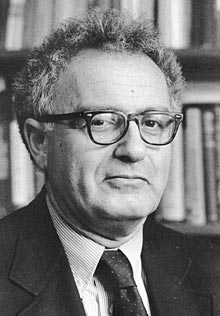UC Berkeley Press Release
Medieval history professor, devoted to students, dead at 79
BERKELEY – Gerard Ernest Caspary, a University of California, Berkeley, professor emeritus of medieval history known for his powerful intellect and his exceptional devotion to his students, died at his home in Berkeley this weekend. He was 79.
The cause and time of his death were not immediately known.
 Gerard Caspary |
"I would think I'd discovered something new, and I would talk to Gerry and he would say, 'Yes, of course...' He was just an enormously educated man who read constantly and was adored by his students. He was an extraordinarily devoted teacher who educated generations of professors in medieval history."
Philippe Buc, a former student of Caspary's in the late 1980s and currently a medieval history professor at Stanford University, said he owes a great deal of his training and ideas to the professor. Caspary had "a mind of stupendous clarity, knowledge and generosity," said Buc. "Much of Caspary's contribution to medieval history was through his open-handed mentorship of his graduate students, to whom he handed over ideas that still lay unpublished in typescript form."
Caspary received his bachelor's degree in education from Swarthmore College in 1950. He went on to Harvard University, where in 1952 he received his master's degree in history and in 1962 his doctorate degree in history.
Among his honors and awards was a Guggenheim Fellowship in 1962. His major publications include "Politics and Exegesis: Origen and the Two Swords of Luke" (University of California Press), published in 1979. After writing that book, Caspary devoted more attention to understanding the development of what he called "the grammar of Christian thought," that is, the deep semantic, conceptual and ideological structures and dynamics that shaped Christian discourse in Late Antiquity and the early Middle Ages, especially in the works of St. Augustine, colleagues said.
"Gerry was a scholar's scholar whose elegant and intricate work on Origen remains a classic," said Beth Berry, chair of UC Berkeley's Department of History. "But it is his teaching that is legendary. Stories still circulate about a course he offered years ago on Saint Augustine, which was a must-attend event twice every week for all the departmental titans of the time."
Caspary was born Jan. 10, 1929, in Frankfurt, Germany. Fass, his colleague and friend, said Caspary's family was well-educated and had a highly-regarded international mercantile business based in Germany that had branches in various parts of the world.
In the 1930s, during the rise of the Nazi Party, Caspary's parents fled Germany for Paris, and it was there that he received much of his childhood education until the Nazis invaded the city in 1940, according to Fass. Caspary and his parents went into hiding until his parents were captured and eventually killed in Auschwitz concentration camp; Caspary hid with another Jewish family until after World War II, when he briefly joined his grandparents in Sweden.
An uncle, Richard Krautheimer, a renowned art historian at the time, then brought Caspary from Europe to the United States, said Fass, where Caspary began attending Swarthmore at age 16.
Fass is uncertain what propelled Caspary to study medieval history. "I think it was related to his extraordinary knowledge of languages including Italian, French, German, Greek and Latin," she said.
She also said he was not at all that eager initially to get closer to his experience regarding the Holocaust. "At the end of his life, however," she said, "he had a huge collection on the Holocaust, taught several seminars on the Holocaust. At his death, he was writing a family memoir including letters sent between his mother in France and grandmother in Sweden as the war was closing in on them. He had a full draft (manuscript)."
Caspary, an only child who never married, has no known living relatives, according to Fass. His friends and colleagues are planning a private memorial service.
A memorial fund is being set up in coordination with the Department of History. For more information on the fund, please contact the department.

